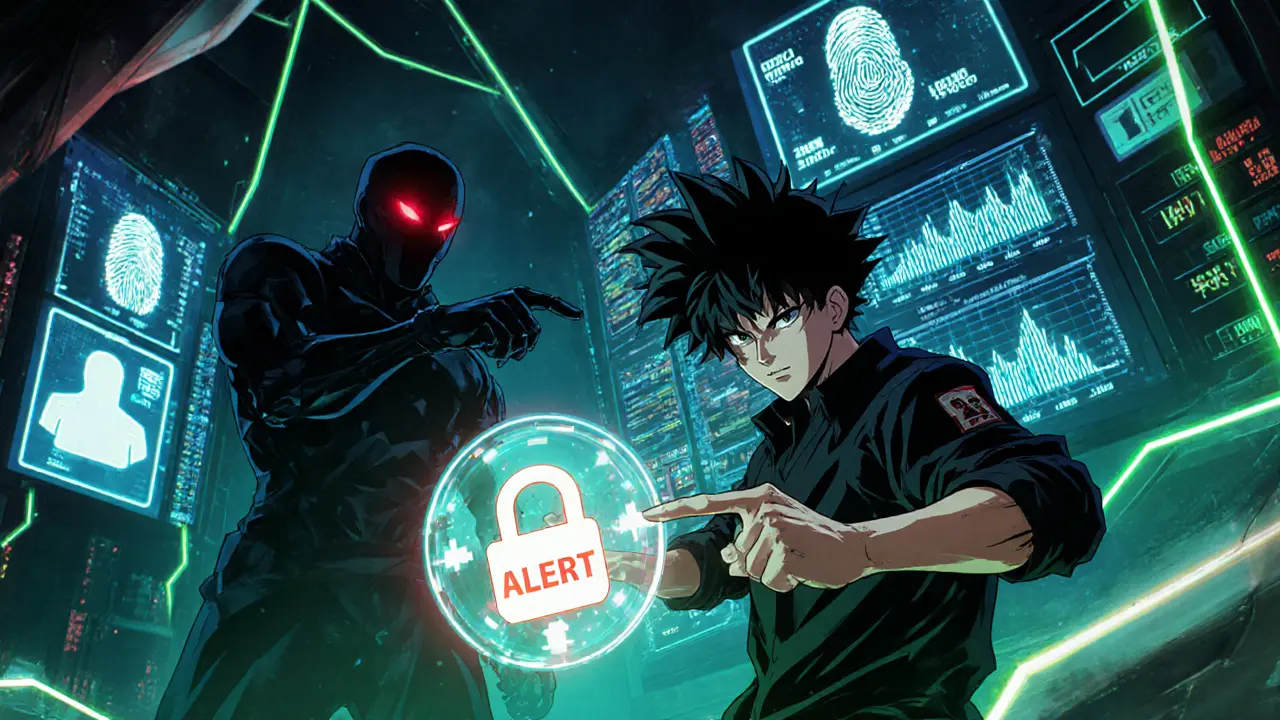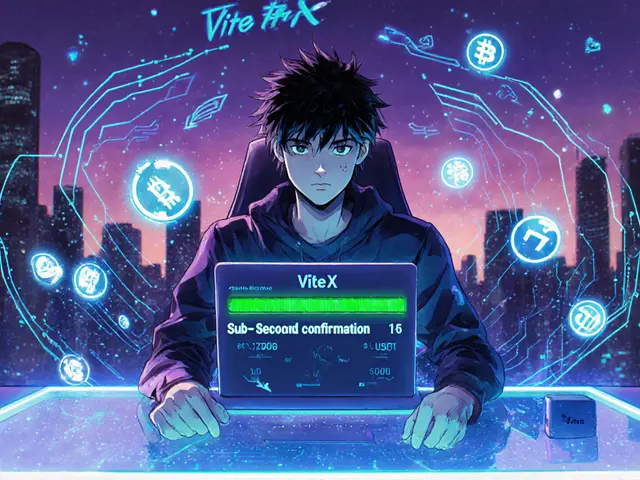VPN Risk Assessment Tool
Assess Your VPN Security
Answer the following questions about your current VPN setup to determine your risk level for trading crypto in Iran.
Your Risk Assessment
Iranian crypto traders lean on VPN crypto Iran to slip past geoblocks, but the safety net is getting ripped apart. In 2025 the crackdown has tightened, and a single VPN drop can freeze a wallet, wipe out months of profit, or land a user in legal hot water. This guide breaks down why VPNs are still the go‑to tool, how exchanges sniff out users, which VPN choices raise red flags, and what you can do right now to stay under the radar.
TL;DR
- VPNs let Iranian traders reach global exchanges, but IP leaks or VPN failures instantly expose them.
- Free VPNs are high‑risk: weak encryption, logging, and unstable IPs.
- Paid, no‑log services with kill‑switches reduce exposure but aren’t foolproof.
- Iran’s Central Bank, Iran Cyber Police (FATA), and blockchain‑intelligence firms now use device fingerprinting and transaction pattern analysis.
- Best practice: multi‑layered identity packages, dedicated hardware, and constant VPN health monitoring.
Why Iranian Traders Turn to VPNs
Since sanctions crippled direct access to international finance, Virtual Private Network is a technology that encrypts internet traffic and routes it through servers in other countries, masking the user’s real IP address. For a trader in Tehran, a VPN creates the illusion of being in Dubai, London, or New York, letting them sign up on platforms like Binance, Kraken, or Coinbase that would otherwise block Iranian IPs. The underground market has built full‑stack packages - foreign IBANs, OTP‑ready SIM cards, and forged residency documents - to complement VPNs and pass KYC checks without showing an Iranian identity.
How Exchanges Detect VPN Users
What started as simple IP blocking has morphed into a suite of behavioral analytics. Modern exchanges scan for:
- Sudden IP changes during an active session (a VPN drop).
- Device fingerprinting - correlating browser headers, screen resolution, and installed plugins.
- Transaction timing patterns that match typical Iranian working hours.
- Withdrawal destinations that funnel into known Iranian wallets on the TRON network.
Even when a VPN is active, the combination of these signals can flag a user as high‑risk, triggering automatic account suspension.
Free vs. Paid VPNs: A Risk Comparison
| Feature | Free VPN | Paid VPN |
|---|---|---|
| Encryption level | Basic (usually AES‑128) | Strong (AES‑256 + OpenVPN/WireGuard) |
| IP stability | Frequent changes, shared IP pools | Dedicated or rotating IPs with low churn |
| Logging policy | Often keeps logs, may sell data | No‑log, audited privacy policies |
| Speed | Slow, high latency due to overcrowding | Fast, optimized servers for streaming/trading |
| Kill‑switch | Rarely available | Standard feature, cuts traffic on drop |
| Price | Free (ad‑supported) | US$5‑15/month |
Free services are especially dangerous for Iranian traders. Besides the obvious performance hit, many free providers lack robust encryption, making it easier for sophisticated blockchain‑intelligence platforms to sniff traffic. Some even harvest user data and sell it to third parties, creating a direct leak of the very IP you’re trying to hide.

Regulatory Enforcement in 2025
Iran’s crackdown has escalated on three fronts:
- Central Bank of Iran the monetary authority that bans domestic crypto payments while allowing licensed miners to sell mined coins has frozen over one million bank accounts linked to crypto activity.
- Iran Cyber Police (FATA) the cyber‑law enforcement agency that conducts raids on illegal crypto operations and tracks VPN usage through DPI (deep packet inspection) now collaborates with international blockchain intelligence firms.
- International blockchain intelligence platforms companies that analyze on‑chain data, identify wallet clusters, and publish bounty programs targeting Iranian exchanges have started a wallet‑identification bounty specifically for Nobitex.
These coordinated actions mean that even a perfectly working VPN can’t hide you if the exchange notices a pattern that matches known Iranian wallets on the TRON network a high‑throughput blockchain where 87% of Iranian crypto volume flows through in 2025.
Impact on Trading Volumes and Wallets
Data from March‑July 2025 shows a steep decline: overall crypto inflows to Iran fell more than 50% YoY, with a June‑July plunge of 76% as enforcement sharpened. Nobitex, which processed $3billion of Iranian‑linked flow in the first half of 2025, saw $2billion of that move on the TRON network. When the platform’s security breach exposed user data, many traders fled to offshore exchanges, but the new detection layers there soon caught up, leading to mass account freezes and loss of access to funds.
Practical Steps to Lower Detection Risk
- Choose a reputable paid VPN. Look for AES‑256 encryption, a kill‑switch, and dedicated IPs in a jurisdiction that respects privacy.
- Run the VPN on a separate device or virtual machine. This isolates the trading app from any background processes that could leak DNS requests.
- Use a hardware router that forces all traffic through the VPN, preventing accidental IP fallback.
- Combine VPN with a no‑log identity package a service that supplies foreign IBANs, OTP‑ready SIM cards, and forged residency documents for KYC bypass. Verify that the package updates IPs regularly to avoid pattern detection.
- Enable two‑factor authentication on the exchange, but route the 2FA SMS through a foreign number to keep the Iranian carrier out of the loop.
- Monitor VPN health: set up alerts for connection drops and automatically halt any active trades if the kill‑switch triggers.
- Spread withdrawals across multiple blockchain networks; avoid concentrating funds on TRON if you’re using a known Iranian exchange.
Future Outlook: Will VPNs Remain Viable?
Experts predict that detection techniques will keep evolving. As blockchain‑intelligence firms broaden their bounty programs, they’ll deploy AI‑driven clustering that can link a series of seemingly unrelated wallets back to a single user, even across different VPN exit nodes. Meanwhile, Iran’s own cyber‑police are investing in DPI equipment capable of spotting VPN traffic signatures, meaning even encrypted tunnels might be flagged.
That said, the underground market is resilient. New tools like Hamster Combat - a crypto‑earning game that bypasses traditional exchanges - are already gaining traction among users who want to stay off the radar. For now, a layered approach-paid VPN, dedicated hardware, and robust identity packages-offers the best chance of trading without a shutdown.
Frequently Asked Questions
Can I use a free VPN to trade crypto from Iran?
Free VPNs are risky. They often lack strong encryption, keep logs, and share IPs with many users, making it easy for exchanges to spot an Iranian fingerprint. A paid, no‑log service with a kill‑switch is strongly recommended.
What happens if my VPN disconnects during a trade?
Most exchanges monitor IP changes in real time. A drop instantly reveals your Iranian IP, leading to immediate account suspension, frozen assets, and possibly a request for additional verification.
Is device fingerprinting more effective than IP blocking?
Yes. Fingerprinting looks at browser version, screen size, language settings, and even timing of clicks. Even with a stable VPN IP, an inconsistent fingerprint can flag you as high‑risk.
Do Iranian exchanges like Nobitex face the same detection pressure?
Nobitex processes most Iranian crypto volume, but it’s now under intense scrutiny from both domestic regulators and international blockchain‑intelligence firms. The recent wallet‑identification bounty program means accounts can be frozen even without a VPN slip‑up.
How can I protect my 2FA codes from being linked to Iran?
Register the exchange’s 2FA SMS to a foreign SIM offered by an identity‑package provider. Avoid using Iranian carriers, and consider using an authenticator app that stores codes locally rather than via SMS.









Comments (25)
MARLIN RIVERA
July 16, 2025 AT 15:04 PMWhen you pick a VPN for trading crypto in Iran, you need more than just a cheap subscription. The encryption tier alone tells you whether your traffic will survive a DPI sweep. If the provider keeps logs, you’re practically handing your IP to the regime. A kill‑switch is not a nice‑to‑have, it’s a lifeline when the ISP forces a blackout. Anything less is a liability you can’t afford.
Jayne McCann
July 18, 2025 AT 22:37 PMFree VPNs are a massive red flag.
Bobby Ferew
July 21, 2025 AT 06:10 AMThe latency profile of a shared IP pool can cause transaction timestamp drift, which in a high‑frequency crypto environment translates to slippage. Moreover, TLS handshake anomalies become fingerprintable vectors for Deep Packet Inspection (DPI) apparatus. A no‑log policy is often a marketing veneer lacking independent audit certification. Users should demand multi‑hop routing with independent jurisdictional dissociation to mitigate correlation attacks.
celester Johnson
July 23, 2025 AT 13:44 PMConsider the philosophical implications of trusting a black box to safeguard your financial sovereignty. When the state’s surveillance apparatus can infer your digital footfall, the act of trading becomes an ethical compromise. The VPN provider, in essence, becomes a custodian of your digital conscience, yet many fail to recognize this duty. Their advertised “no‑logs” are frequently a veneer for selective retention, which erodes the very privacy you seek. In the grand schema, the illusion of anonymity may lull you into complacency, inviting harsher reprisals. The moral hazard lies not merely in the technology but in the trust you place in corporate narratives. Without epistemic clarity, you trade at the discretion of unseen gatekeepers. Consequently, the risk matrix expands beyond technical parameters to encompass existential exposure. In sum, the choice of VPN intertwines with the philosophy of digital resistance.
Prince Chaudhary
July 25, 2025 AT 21:17 PMChoosing a paid service with a transparent privacy policy is a solid first step. A dedicated IP reduces the chance of being lumped with suspicious traffic. Make sure the kill‑switch triggers instantly on any drop. Respect the provider’s boundaries, but also hold them accountable. Your safety depends on both sides honoring the agreement.
John Kinh
July 28, 2025 AT 04:50 AMHonestly, most people overthink this stuff 😂. If you’re already paying for a VPN, just tick the boxes and move on 🤷♂️. I doubt the extra settings make a real difference for most traders. Just don’t be too paranoid.
Mark Camden
July 30, 2025 AT 12:24 PMWhile the sentiment is appreciated, it overlooks critical compliance aspects. Iranian regulations classify certain crypto activities as illicit, so a VPN alone does not exempt you from legal scrutiny. Moreover, a paid service does not guarantee jurisdictional immunity; many providers are subject to US/European data-sharing treaties. Therefore, supplement VPN usage with thorough KYC avoidance strategies and consider offshore exchange options. Ignoring these layers could expose you to enforcement actions despite a premium VPN.
Nathan Blades
August 1, 2025 AT 19:57 PMDon’t underestimate the power of a robust kill‑switch – it’s the guardian angel when connection hiccups strike. Pair that with AES‑256 encryption, and you’ve built a fortress around your trades. Remember, rotating dedicated IPs keep you one step ahead of pattern analysis. Stay vigilant, stay profitable, and let the tech work for you.
Somesh Nikam
August 4, 2025 AT 03:30 AMMaintaining a consistent encryption standard is paramount; AES‑256 offers a statistical advantage over weaker ciphers. Equally, selecting a provider that publishes independent audit reports confirms their no‑log claim. When the IP pool churn is low, the probability of correlation drops significantly. Finally, a well‑implemented kill‑switch ensures zero data leakage during abrupt disconnections.
Jan B.
August 6, 2025 AT 11:04 AMGreat points, especially about audit transparency.
Debby Haime
August 8, 2025 AT 18:37 PMEven seasoned traders can slip up on VPN basics, so a quick checklist helps. Verify your VPN’s DNS leak protection before each session. Use a checksum tool to confirm your traffic is fully encrypted. When in doubt, run a packet capture to validate the tunnel.
Andy Cox
August 11, 2025 AT 02:10 AMHonestly, the community often forgets that simple things like updating the client can patch major leaks. Keep the software fresh, and you’ll avoid many headaches.
Courtney Winq-Microblading
August 13, 2025 AT 09:44 AMThe tapestry of online anonymity is woven with threads of encryption, jurisdiction, and user diligence. When those strands intersect correctly, you create a resilient shield against prying eyes. However, neglect any one strand, and the fabric unravels, exposing your digital footprint.
Chad Fraser
August 15, 2025 AT 17:17 PMExactly! And don’t forget to rotate your server location every few days – it adds another layer of confusion for any monitoring entity.
Richard Herman
August 18, 2025 AT 00:50 AMBalancing security with usability is key; an overly complex setup can deter consistent usage, which defeats the purpose.
Parker Dixon
August 20, 2025 AT 08:24 AMFirst, understand that Iran’s internet infrastructure is heavily filtered, and VPN traffic is a primary target for deep packet inspection. A VPN with strong obfuscation can disguise its traffic as ordinary HTTPS, reducing the chance of detection. Second, select a provider that offers multi‑hop routing, preferably across multiple continents, to add latency layers that mask your true origin. Third, ensure the encryption suite includes AES‑256 combined with SHA‑2 authentication for integrity verification. Fourth, verify that the provider’s kill‑switch is hard‑wired into the OS network stack, so any VPN drop results in a complete network blackout. Fifth, use dedicated or static IP addresses rather than shared pools, as static IPs are less likely to be flagged in bulk surveillance. Sixth, consider implementing a secondary VPN or Tor over VPN for an extra obfuscation tier when handling especially large trades. Seventh, regularly test for DNS leaks using reputable online tools; a leak can betray your location even if the tunnel is intact. Eighth, keep the VPN client up to date to patch any protocol-level vulnerabilities that may be exploited by state actors. Ninth, be mindful of the metadata you transmit – usernames, API keys, and exchange identifiers can be fingerprinted even through an encrypted tunnel. Tenth, avoid logging personal data on the exchange side; use privacy‑focused wallets that don’t require KYC. Eleventh, split your trading activities across multiple exchanges to diffuse risk. Twelfth, employ hardware wallets and only connect them via the VPN when needed. Thirteenth, maintain a separate, clean OS environment – perhaps a virtual machine – dedicated solely to trading, reducing the attack surface. Fourteenth, set up alerts for any unexpected connection drops, so you can react instantly. Finally, stay informed about regional regulatory changes; the legal landscape can shift, affecting how VPN usage is interpreted. By following these layered defenses, you significantly reduce the probability of detection while safeguarding your crypto assets 😊.
Stefano Benny
August 22, 2025 AT 15:57 PMWhile that checklist is exhaustive, many traders won’t implement all steps, and the marginal security gain after the first few layers is diminishing 📉.
Evie View
August 24, 2025 AT 23:30 PMYour approach sounds naive; relying on a VPN does not make you invisible to a state with advanced cyber capabilities. You need to assume they will eventually breach any technical barrier you set up.
Sidharth Praveen
August 27, 2025 AT 07:04 AMStay positive, keep learning, and you’ll navigate the risks successfully.
Sophie Sturdevant
August 29, 2025 AT 14:37 PMLeverage a no‑log VPN, enforce strict API key segregation, and adopt hardware wallets to minimize exposure. These practices, combined with aggressive monitoring, create a robust defense against state‑level threats.
emmanuel omari
August 31, 2025 AT 22:10 PMOur nation’s sovereignty demands that we use only domestically approved solutions; foreign VPNs are a gateway for espionage. Trust the home‑grown services to protect your assets while aligning with national interests.
katie littlewood
September 3, 2025 AT 05:44 AMIn my experience, the interplay between encryption depth and IP rotation frequency creates a nuanced risk profile that cannot be captured by a simple low‑medium‑high rubric. By modeling the stochastic behavior of ISP throttling alongside VPN handshakes, one can derive a probabilistic estimate of detection likelihood. This approach, while mathematically intensive, yields actionable insights for traders seeking optimal security without sacrificing performance.
Jenae Lawler
September 5, 2025 AT 13:17 PMIt is imperative to approach this discourse with the utmost scholarly rigor, eschewing populist simplifications in favor of a meticulously referenced analysis.
Katrinka Scribner
September 7, 2025 AT 20:50 PMso i think using vpn is good but watch out for leaks typo msissed but its fine 😊
VICKIE MALBRUE
September 10, 2025 AT 04:24 AMOptimism + good VPN = safe trades